LEONARD
COHEN'S
HYDRA
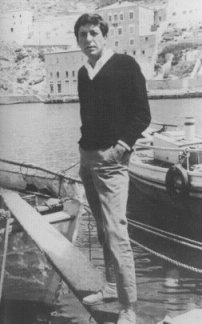
Leonard's House
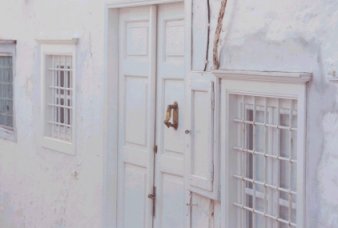 On September 27, 1960, six days after his twenty-sixth birthday, Cohen bought
a house in Hydra for $1500, using a bequest from his recently deceased
grandmother. This was a "big deal" in the words of one of his friends, a
commitment to place and a world that was mysterious and unusual. Buying the
house was a complicated act, needing the assistance of his friend Demetri
Gassoumis as translator, adviser, and witness to the deed. Cohen later said
that it was the smartest decision he ever made. The tree-story, ancient
whitewashed building, with its five rooms on several levels, was run down and
had no electricity, plumbing or running water. Yet it was a private space
where he could work, either on the large riled terrace or in his music room
on the third floor. On September 27, 1960, six days after his twenty-sixth birthday, Cohen bought
a house in Hydra for $1500, using a bequest from his recently deceased
grandmother. This was a "big deal" in the words of one of his friends, a
commitment to place and a world that was mysterious and unusual. Buying the
house was a complicated act, needing the assistance of his friend Demetri
Gassoumis as translator, adviser, and witness to the deed. Cohen later said
that it was the smartest decision he ever made. The tree-story, ancient
whitewashed building, with its five rooms on several levels, was run down and
had no electricity, plumbing or running water. Yet it was a private space
where he could work, either on the large riled terrace or in his music room
on the third floor. Cohen described his home to his mother:
It has a huge terrace with a view of dramatic mountain and shining white
houses. The rooms are large and cool with deep windows set in thick walls. I
suppose it's about 200 years old and many generations of sea-.men must have
lived here. I will do a little work on it every year and in a few years it
will be a mansion... I live on a hill and life has been going on here exactly
the same for hundreds of years. All through the day you hear the calls of the
street vendors and they are really rather musical... I get up around 7
generally and work till about noon. Early morning is coolest and therefore
best, but I love the heat anyhow, especially when the Aegean Sea is 10 minutes
from my door.
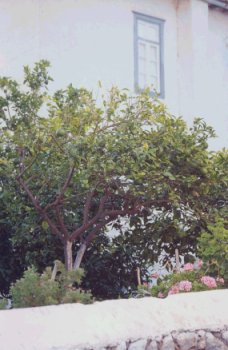 He knew he had been accepted by the community when he began receiving regular
visits from the garbage man and his donkey. It is like receiving the Legion
of Honour. Cohen's house gave him a foundation. To a friend he explained that
Having this house makes cities less frightening. I can always come back and
get by. But I don't want to lose contact with the metropolitan experience.
Buying the house also gave him confidence: The years are flying past and we
all waste so much time wondering if we dare to do this or that. The thing is
to leap, to try, to take a chance. (2)
He knew he had been accepted by the community when he began receiving regular
visits from the garbage man and his donkey. It is like receiving the Legion
of Honour. Cohen's house gave him a foundation. To a friend he explained that
Having this house makes cities less frightening. I can always come back and
get by. But I don't want to lose contact with the metropolitan experience.
Buying the house also gave him confidence: The years are flying past and we
all waste so much time wondering if we dare to do this or that. The thing is
to leap, to try, to take a chance. (2)
It was a place of solitude, of plodding donkeys (even today no cars are
allowed on the island; nor would they get very far if they were), cold water
and kerosene lamps. In such primitive surroundings, amid the stunning beauties
of the island and the glories of the Aegean, where fishermen still wrested a
living from the sea and ferries scrabbled one from the land, Leonard found
his peace, his sitting-down time, as he called it, where he could -as all
pots must - recollect in tranquillity. Here he could live in virtually
complete seclusion, at a fraction of the cost it would take in Northern Europe
or Canada, where the people were unconcerned as to who you were or what you
diod; And where breathtaking vistas opened up for the seeing - both external
and internal.
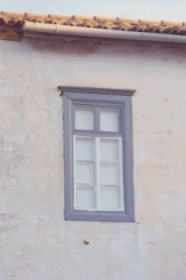 Here Leonard discovered the Greek way of life - its alternating rhythms of
work and leisure, both on the seasonal and daily basis, which are so
conductive to creative thought and achievement. Here he was able to stand back
from the onrush of western man and ask himself the real questions of life and
meaning, get his young life, full and successful as it had been, into
perspective. Here he began to crystallize the wisdom of some of his best
poetry, writing and songs, (or it was here that he was reborn, where he truly
began to find himself, where not least, the music of Greece entered his soul,
evoking earlier memories and melodies, combining with them to suggest a new
style, a new mystique.
Here Leonard discovered the Greek way of life - its alternating rhythms of
work and leisure, both on the seasonal and daily basis, which are so
conductive to creative thought and achievement. Here he was able to stand back
from the onrush of western man and ask himself the real questions of life and
meaning, get his young life, full and successful as it had been, into
perspective. Here he began to crystallize the wisdom of some of his best
poetry, writing and songs, (or it was here that he was reborn, where he truly
began to find himself, where not least, the music of Greece entered his soul,
evoking earlier memories and melodies, combining with them to suggest a new
style, a new mystique.
And it was here, that he met Marianne, a young woman of great beauty, high
intelligence, deep sympathy and fun. The gods had drawn them together, and
together for 10 years or so they would make music, exploring the world and
themselves, unharried by outside pressures, responding only to the more
meaningful pressures of life and love.(1)
|
Back to the Sixties
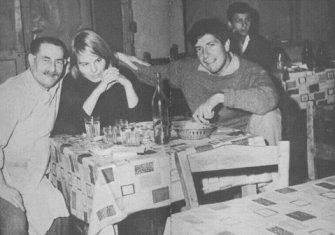
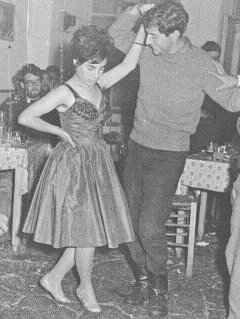

|
Days of Kindness
Greece is a good place
To look at the moon, isn´t it
You can read by moonlight
You can read on the terrace
You can see a face
As you saw it when you were young
There was good light then
Oil lamps and candles
And those little flames
That floated on a cork in olive oil
What I loved in my old life
I haven´t forgotten
It lives in my spine
Marianne and the child
The days of kindness
It rises in my spine
And it manifests as tears
I pray that a loving memory
Exists for them too
The precious ones I overthrew
For an education in the world
Hydra, 1985
|
Bird on THE Wire
 |
Bird on the Wire began in Greece, when Cohen first arrived in Hydra, there
were no wires on the island, no telephones and no regular electricity. But
soon telephone poles appeared, and then the wires. I would stare out the
window at these telephone wires and think, how civilization had caught up with me and I
wasn't going to be able to escape after all. I wasn't going to be able to live
this eleventh-century life that I had thought I had found for myself. So that
was the beginning. Then he noticed that the birds came to the wires. The next
line referred to the many evenings Cohen and friends climbed the endless
stairs up from the port of Hydra, drunk and singing. Often you see: three
guys with the arms around each other , stumbling up the stairs and singing
these impeccable thirds. He finished the song in a Hollywood motel on Sunset
Boulevard in 1969.(2)
Like a bird on the wire,
like a drunk in a midnight choir
I have tried in my way to be free.
Like a worm on a hook,
like a knight from some old fashioned book
I have saved all my ribbons for thee.
If I, if I have been unkind,
I hope that you can just let it go by.
If I, if I have been untrue
I hope you know it was never to you.
|
Text credits:
(1) from the book Prophet of the Heart by Loranne S. Dorman & Clive L. Rawlins.
(2) from the
book Various Positions by Ira B. Nadel.
The poem has been reprinted from Stranger Music,
© 1985 and 1993 by Leonard Cohen. Reprinted by permission.
Photo credits:
Photos of Leonard Cohen's house © 1998 by Henry Denander, Sweden. Used by permission.
Black and white photos from Leonard Cohen's archive, reprinted here from the songbook
Songs of Leonard Cohen, except the harbour photo taken from Nadel's book.
|

![[PREV PAGE]](but-prev.gif)
![[NEXT PAGE]](but-next.gif)
![[INDEX PAGE]](but-ndx.gif)
![[SUB INDEX PAGE]](but-subi.gif)
 On September 27, 1960, six days after his twenty-sixth birthday, Cohen bought
a house in Hydra for $1500, using a bequest from his recently deceased
grandmother. This was a "big deal" in the words of one of his friends, a
commitment to place and a world that was mysterious and unusual. Buying the
house was a complicated act, needing the assistance of his friend Demetri
Gassoumis as translator, adviser, and witness to the deed. Cohen later said
that it was the smartest decision he ever made. The tree-story, ancient
whitewashed building, with its five rooms on several levels, was run down and
had no electricity, plumbing or running water. Yet it was a private space
where he could work, either on the large riled terrace or in his music room
on the third floor.
On September 27, 1960, six days after his twenty-sixth birthday, Cohen bought
a house in Hydra for $1500, using a bequest from his recently deceased
grandmother. This was a "big deal" in the words of one of his friends, a
commitment to place and a world that was mysterious and unusual. Buying the
house was a complicated act, needing the assistance of his friend Demetri
Gassoumis as translator, adviser, and witness to the deed. Cohen later said
that it was the smartest decision he ever made. The tree-story, ancient
whitewashed building, with its five rooms on several levels, was run down and
had no electricity, plumbing or running water. Yet it was a private space
where he could work, either on the large riled terrace or in his music room
on the third floor.  He knew he had been accepted by the community when he began receiving regular
visits from the garbage man and his donkey. It is like receiving the Legion
of Honour. Cohen's house gave him a foundation. To a friend he explained that
Having this house makes cities less frightening. I can always come back and
get by. But I don't want to lose contact with the metropolitan experience.
Buying the house also gave him confidence: The years are flying past and we
all waste so much time wondering if we dare to do this or that. The thing is
to leap, to try, to take a chance. (2)
He knew he had been accepted by the community when he began receiving regular
visits from the garbage man and his donkey. It is like receiving the Legion
of Honour. Cohen's house gave him a foundation. To a friend he explained that
Having this house makes cities less frightening. I can always come back and
get by. But I don't want to lose contact with the metropolitan experience.
Buying the house also gave him confidence: The years are flying past and we
all waste so much time wondering if we dare to do this or that. The thing is
to leap, to try, to take a chance. (2) Here Leonard discovered the Greek way of life - its alternating rhythms of
work and leisure, both on the seasonal and daily basis, which are so
conductive to creative thought and achievement. Here he was able to stand back
from the onrush of western man and ask himself the real questions of life and
meaning, get his young life, full and successful as it had been, into
perspective. Here he began to crystallize the wisdom of some of his best
poetry, writing and songs, (or it was here that he was reborn, where he truly
began to find himself, where not least, the music of Greece entered his soul,
evoking earlier memories and melodies, combining with them to suggest a new
style, a new mystique.
Here Leonard discovered the Greek way of life - its alternating rhythms of
work and leisure, both on the seasonal and daily basis, which are so
conductive to creative thought and achievement. Here he was able to stand back
from the onrush of western man and ask himself the real questions of life and
meaning, get his young life, full and successful as it had been, into
perspective. Here he began to crystallize the wisdom of some of his best
poetry, writing and songs, (or it was here that he was reborn, where he truly
began to find himself, where not least, the music of Greece entered his soul,
evoking earlier memories and melodies, combining with them to suggest a new
style, a new mystique.


